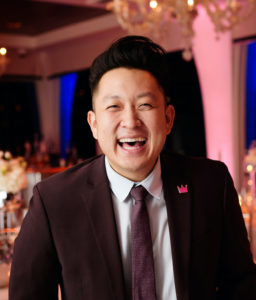 Jason Rhee grew up as one of a handful of Asians in a predominantly white Orange County community, and it wasn’t until 2020 that he started having serious conversations about race. Jason, a wedding and event planner with decades in the hospitality industry under his belt, admits he helped perpetuate some of the stereotypes associated with keeping one’s head down and staying silent, rather than speaking out – but he’s now making a point to take a decidedly different approach.
Jason Rhee grew up as one of a handful of Asians in a predominantly white Orange County community, and it wasn’t until 2020 that he started having serious conversations about race. Jason, a wedding and event planner with decades in the hospitality industry under his belt, admits he helped perpetuate some of the stereotypes associated with keeping one’s head down and staying silent, rather than speaking out – but he’s now making a point to take a decidedly different approach.
It’s not an innate desire to become a social activist that drives him – instead, Jason is the first to acknowledge that he doesn’t have all the answers when it comes to eradicating inequalities in the hospitality industry. What he does have, though, are some compelling ideas about what employers and members of the hospitality community – and the world at large – can do to fight injustices, break out of the bystander role and otherwise improve working conditions for employees from all walks of life.
“Hospitality groups and bars and restaurants – they’re running businesses. Money is the bottom line. Sometimes, they’re hesitant to speak out about the injustices they see or the beliefs they hold because they’re afraid of alienating people or being cut out of a group,” he said. “But this is 2021 – it’s disheartening to see any group feel pain or trauma, and it’s time we start being more cognizant and prioritizing value systems over profits.”
Jason noted that the death of George Floyd was the catalyst that encouraged him to become more vocal about equality and more deeply involved in social justice efforts. He also said that issues of racial and social injustice are particularly pervasive in hospitality, where patrons often have a high degree of privilege and a strong disparity exists between the income levels of consumers and employees.
“We need to normalize the conversations about race, discrimination and marginalization,” he said. “In hospitality, we’ve all heard the phrase ‘community over competition’ and how what benefits one of us benefits us all – but what we don’t see are enough employers and people out there putting these ideals into practice.”
So, what might hospitality employers do to better-protect their workers and better-promote inclusiveness in their businesses, and what might workers do to help initiate long-overdue industry change?
“A lot of people who run businesses are reluctant to take a political stance,” Jason said. “But, at some point, we need to ask ourselves – why are we working so hard to serve people who uphold damaging and dangerous ideals?”
Consumers can help by refusing to patronize restaurants and businesses known to uphold discriminatory practices or viewpoints. Employees and businesses that want to make a difference, meanwhile, can start by speaking freely about injustices and opening up the lines of conversation internally.
“It’s not always easy for workers to tell their bosses they’re feeling uncomfortable or excluded, but there are things employers can do to garner honest feedback,” he said.
Having employees complete anonymous surveys is one way to develop a true sense of a particular work environment. Bringing in a diversity, inclusion and equity expert who can assess the situation and determine an appropriate course of action for improvement is another.
Many hospitality employers can afford to make these types of investments. Yet, many restaurant and food-service employees lack the resources needed to financially support the actions of organizations such as Stop AAPI Hate, which works to track and reduce incidents of violence and discrimination against Asian Americans and Pacific Islanders.
“Hospitality workers may not always have financial resources they can donate to the cause, but what they do have is time and a platform,” Jason said. “Now, we need to stop taking the quote-unquote ‘high road’ and stop looking the other way – we’ve all seen the problems this has caused in the past.”
Jason also notes that hospitality workers don’t need to consider themselves experts in the fight for equality to help promote inclusiveness in the industry.
“I’m not an activist or a leader – I’m just a minority who has been there and someone who wants to help make hospitality work better,” he said. “We all need to speak up and be more vocally anti-racist, and not for performative measures, but to inspire real change. It’s OK to make mistakes and not be perfect – but it’s not OK to be complacent when that means perpetuating a cycle that continues to hurt hardworking people.”

